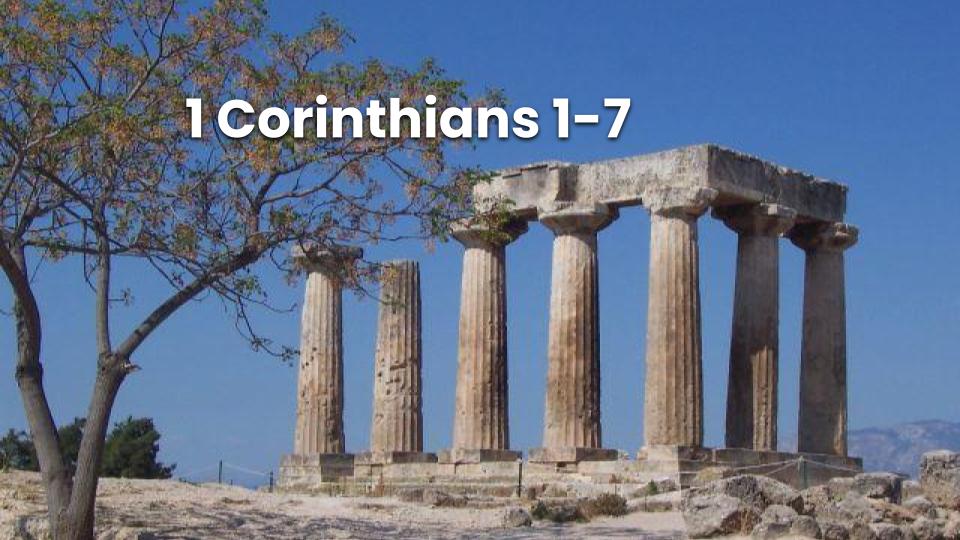Here are some ideas for learning and teaching a few of the great principles in 1 Corinthians 1-7. And while you’re here, I recommend you check out my free online course, “Seeking Jesus.”
Videos for 1 Corinthians
The Bible Project videos doing a great job of helping us understand the big picture of 1 Corinthians. Watch here.
A lesser-known seminary video (more than 30 years old!) is called, “The Body is a Temple,” based on 1 Corinthians 3:16-17, 6:19. It still might be helpful in teaching youth.
A lesser-known video for youth, “I Choose to be Pure” would be a great addition to teaching 1 Corinthians 6 (see more below).
Ideas for Learning More About 1 Corinthians 1-7
***“The preaching of the cross . . . is the power of God”***
Paul wrote, “The preaching of the cross . . . is the power of God” and “I determined not to know any thing among you, save Jesus Christ, and him crucified” (1 Cor. 1:18; 2:1–2). Paul specifically adopted a style of teaching that avoided detracting from “the cross of Christ” (1 Cor. 1:17). We might be surprise to learn that this was not easy. Let me make an analogy.
What if you were called to preach the gospel to a group of people who believed that anybody who saw God was cursed? It would be pretty difficult to teach people about Joseph Smith and the First Vision! The Apostle Paul faced a similar situation when telling people about the Savior’s Atonement. He wrote that preaching of “Christ crucified” was “a stumblingblock” to the Jews (1 Cor. 1:23). The Greek word translated as “stumblingblock” in this passage is skandalon. You don’t need to read Greek to recognize this as the root of the English word scandal. Christ’s Crucifixion was scandalous to many Jewish people. Why?
Devout Jews were familiar with Deuteronomy 21:22–23, which states that those who were hung on a tree (including those being crucified) were “accursed of God.” Imagine being an early Christian missionary, telling Jewish people about the Savior. “Have you heard about Jesus Christ?” you might ask. “He worked miracles, taught with power, and died for our sins on the cross.”
“What?” your listeners respond. “He was hung on a tree? He must be cursed!” It is easy to see how the message that Christ bore “our sins in his own body on the tree” would be scandalous to Jewish listeners (1 Pet. 2:24). Paul reversed the scandal by teaching that everybody is cursed because nobody perfectly keeps all the commandments (see Gal. 3:10; compare Deut. 28:15). Paul also in essence taught, “Yes, Christ was cursed—but he was cursed for us, and by doing so, he redeemed us from being unable to fully comply with God’s laws. His curse overcomes our curse” (see Gal. 3:13).
Christ’s Crucifixion was also a stumbling block for the Greeks. Paul wrote, “We preach Christ crucified . . . [which is] unto the Greeks foolishness” (1 Cor. 1:22–23). Greeks contemplating converting to Christianity would need to trade in their powerful gods for one who died a disgraceful death of the sort that was not even discussed in polite society. The idea of worshipping a being who shamefully died was ludicrous to the Greeks. As Martin Hengel, an eminent Christian scholar, wrote:
[For Greeks] to believe that the . . . son of the one true God, the mediator at creation and the redeemer of the world, had appeared in very recent times in out-of-the-way Galilee as a member of the obscure people of the Jews, and even worse, had died the death of a common criminal on the cross, could only be regarded as a sign of madness. The real gods of Greece and Rome could be distinguished from mortal men by the very fact that they were immortal—they had absolutely nothing in common with the cross as a sign of shame.
Even though the Jews thought the message of the cross was scandalous and the Greeks believed it was foolishness, Paul relentlessly proclaimed “Christ crucified” (1 Cor. 1:23). The message of Christianity is more acceptable in our day than it was in Paul’s, but all of us will have opportunities to stand up for the Savior in situations where his teachings seem foolish to some. In future days the message of the life, death, and Resurrection of Jesus Christ may become increasingly scandalous.
Elder Robert D. Hales of the Quorum of the Twelve taught, “‘The Family: A Proclamation to the World’ was given long before we experienced the challenges now facing the family. ‘The Living Christ: The Testimony of the Apostles’ was prepared in advance of when we will need it most.” Now, as well as in the days ahead, Paul’s example of boldly proclaiming the Savior encourages us to be “not ashamed of the gospel of Jesus Christ” (Rom. 1:16). Christ’s Crucifixion is not scandalous—it is Jesus showing us his love.
For an introductory article on the importance of Christ’s Crucifixion (including some of Paul’s teachings) see this excellent chapter by Gaye Strathearn. If you want to dive deep into Christ’s Crucifixion, including videos, podcasts, books, and more, see my page focused on Christ’s Crucifixion.
***Choosing to Stay Sexually Pure***
1 Corinthians 6:12-20 is one of the most powerful scriptural passages for teaching about sexual purity. Elder Holland used them in his masterpiece talk, “Of Souls, Symbols, and Sacraments.” Reading these verses in an alternate translation helps us see that in verses 12 and 13 Paul is quoting slogans said by the people of Corinth and then refuting them. I love the simple language of these verses in the New Living Translation:
“You say, “I am allowed to do anything”—but not everything is good for you. And even though “I am allowed to do anything,” I must not become a slave to anything. You say, “Food was made for the stomach, and the stomach for food.” (This is true, though someday God will do away with both of them.) But you can’t say that our bodies were made for sexual immorality. They were made for the Lord, and the Lord cares about our bodies. And God will raise us from the dead by his power, just as he raised our Lord from the dead.
Don’t you realize that your bodies are actually parts of Christ? Should a man take his body, which is part of Christ, and join it to a prostitute? Never! And don’t you realize that if a man joins himself to a prostitute, he becomes one body with her? For the Scriptures say, “The two are united into one.” But the person who is joined to the Lord is one spirit with him.
Run from sexual sin! No other sin so clearly affects the body as this one does. For sexual immorality is a sin against your own body. Don’t you realize that your body is the temple of the Holy Spirit, who lives in you and was given to you by God? You do not belong to yourself, for God bought you with a high price. So you must honor God with your body.”
There’s a lesser-known video about chastity that I might consider sharing if I were a giving a talk or lesson on sexual purity. It’s called “I choose to be pure” and was produced by the Church. After showing this video, have a conversation with those you’re learning with–why do you choose to stay sexually pure?
***Additional Resources***
Paul makes some statements about women that are somewhat confusing. Sherrie Mills Johnson’s article, Paul’s Teachings in 1 Corinthians on Women can help us make sense of them.
It’s important to remember that Corinth was a Greco-Roman city. Learning about elements of its culture and greatly assist us in understanding Paul’s epistle to the Corinthians. Eric D. Huntsman’s article, “”The Wisdom of Men”: Greek Philosophy, Corinthian Behavior, and the Teachings of Paul” is helpful in this regard.
***
I hope these resources are helpful to you in your learning and teaching this week!
Do you want more learning and teaching tips for Come Follow Me? Follow me on Instagram or sign up here for emails with insights on Come Follow Me.






